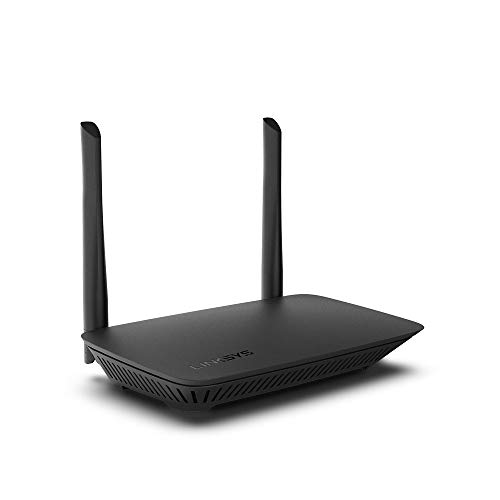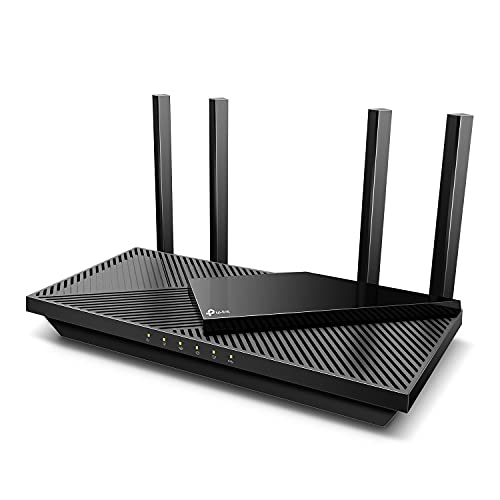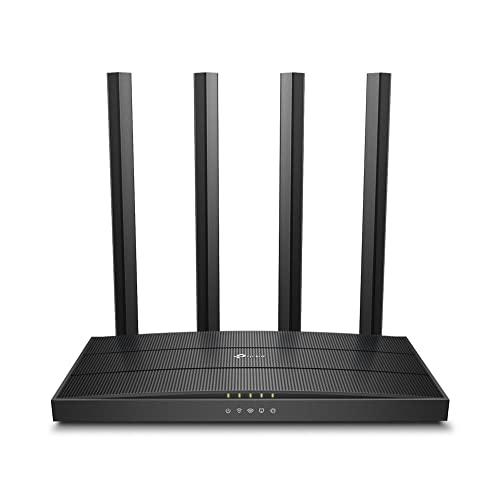TOP PICKS
SaleBestseller No. 1 −25%
TP-Link AX1800 WiFi 6 Router (Archer AX21) – Dual Band Wireless Internet Router, Gigabit Router, Easy Mesh, Works with Alexa - A Certified for Humans Device
- VPN Server: Archer AX21 Supports both Open VPN Server and PPTP VPN Server
- Dual-Band WiFi 6 Internet Router: Wi-Fi 6(802.11ax) technology achieves faster speeds, greater capacity and reduced network congestion compared to the previous generation
- Next-Gen 1.8 Gbps Speeds: Enjoy smoother and more stable streaming, gaming, downloading and more with WiFi speeds up to 1.8 Gbps (1200 Mbps on 5 GHz band and 574 Mbps on 2.4 GHz band)
- Connect more devices: Wi-Fi 6 technology communicates more data to more devices simultaneously using revolutionary OFDMA technology
- Extensive Coverage: Achieve the strong, reliable WiFi coverage with Archer AX1800 as it focuses signal strength to your devices far away using Beamforming technology, 4 high-gain antennas and an advanced front-end module (FEM) chipset
SaleBestseller No. 3 −25%
TP-Link AC1900 Smart WiFi Router (Archer A8) -High Speed MU-MIMO Wireless Router, Dual Band Router for Wireless Internet, Gigabit, Supports Guest WiFi
- OneMesh Compatible Router- Form a seamless WiFi when work with TP-Link OneMesh WiFi Extenders.
- Wave 2 Wireless Internet Router, 600 Mbps on the 2.4GHz band and 1300 Mbps on the 5GHz band
- MU-MIMO Gigabit Router, 3 simultaneous data streams help your devices achieve optimal performance by making communication more efficient
- Boosted WiFi Coverage, Beamforming technology delivers a highly efficient wireless connection, long range WiFi
- Full Gigabit Ports: Create fast, reliable wired connections for your PCs, Smart TVs and gaming console with 4 x Gigabit LAN and 1 x Gigabit WAN. No USB Port
SaleBestseller No. 4 −54%

Linksys E5400 WiFi 5 Dual Band Router | 1,500 Sq. ft Coverage | 10+ Devices | Parental Control, Guest WiFi | Speeds (AC1200) 1.2Gbps
- WORK UNITERRUPTED: Stay connected with a home WiFi that can handle the load. The router eliminates possible dead zones for stable signals up to 1.2 Gbps from room to room.
- LOADS BETTER: With ultra-low latency for lag-free gaming, streaming and binging TV shows. Connect game consoles, smartphones, computers & smart home devices with fast WiFi.
- KID-SAFE INTERNET: Enable Parental Control feature to set time limits, schedule time-specific WiFi access, and restrict websites on kids' devices so they can browse safely online.
- SIMPLE SETUP: The browser-based setup provides clear visual instructions of the entire process so you can get online in minutes. Set separate guest access to keep the network safe.
- SECURE PRIVACY: Blocks internet safety threats with WPA2 wireless encryption & SPI firewall systems. With 4 Gigabit Ethernet ports for fast data transfer & high network throughput.
SaleBestseller No. 5 −75%
Google Nest Wifi - AC2200 - Mesh WiFi System - Wifi Router - 2200 Sq Ft Coverage - 1 pack
- Maximum Range : 2200 Sq Ft
- This product includes one router unit.
- Nest Wifi is a scalable and flexible Wi-Fi system. These Nest Wifi devices work together to blanket your whole home in fast reliable Wi-Fi and eliminate buffering in every room with coverage up to 4400 square feet.[1]
- The Wi-Fi router plugs into your internet provider's modem to create your Wi-Fi network. For more coverage add Nest Wifi routers or points to your system.
- Nest Wifi routers are strong enough to handle up to 200 connected devices and fast enough to stream multiple 4K videos at a time.[2] Compatible with Google Wifi; Ethernet ports included on each router. 15W power adapter.
SaleBestseller No. 6 −33%
TP-Link AX3000 WiFi 6 Router – 802.11ax Wireless Router, Gigabit, Dual Band Internet Router, VPN Router, OneMesh Compatible (Archer AX55)
- Next-Gen Gigabit Wi-Fi 6 Speeds: 2402 Mbps on 5 GHz and 574 Mbps on 2.4 GHz bands ensure smoother streaming and faster downloads; support VPN server and VPN client¹
- A More Responsive Experience: Enjoy smooth gaming, video streaming, and live feeds simultaneously. OFDMA makes your Wi-Fi stronger by allowing multiple clients to share one band at the same time, cutting latency and jitter.²
- Expanded Wi-Fi Coverage: 4 high-gain external antennas and Beamforming technology combine to extend strong, reliable, Wi-Fi throughout your home.
- Improved Battery Life: Target Wake Time helps your devices to communicate efficiently while consuming less power.
- Improved Cooling Design: No heat ups, no throttles. A larger heat sink and redefined case design cools the WiFi 6 system and enables your network to stay at top speeds in more versatile environments.
SaleBestseller No. 7 −10%
TP-Link AC1200 Gigabit WiFi Router (Archer A6) - Dual Band MU-MIMO Wireless Internet Router, 4 x Antennas, OneMesh and AP mode, Long Range Coverage
- Dual band router upgrades to 1200 Mbps high speed internet (300mbps for 2.4GHz plus 900Mbps for 5GHz), reducing buffering and ideal for 4K stream
- Full Gigabit Ports - Gigabit Router with 4 Gigabit LAN ports, ideal for any internet plan and allow you to directly connect your wired devices
- Boosted Coverage - Four external antennas equipped with Beamforming technology extend and concentrate the Wi-Fi signals
- MU-MIMO technology - (5GHz band) allows high speeds for multiple devices simultaneously
- Access Point Mode - Supports AP Mode to transform your wired connection into wireless network, an ideal wireless router for home
Bestseller No. 8
NETGEAR Nighthawk 6-Stream Dual-Band WiFi 6 Router (RAX54S) – AX5400 Wireless Speed (Up to 5.4 Gbps) - Coverage up to 2,500 sq. ft., 25 Devices - 1-Year Armor Subscription Included
- Coverage up to 2,500 sq. ft. for up to 25 devices
- Fast AX5400 Gigabit speed with WiFi 6 technology for uninterrupted streaming, HD video gaming, and web conferencing
- Connects to your existing cable modem and replaces your WiFi router. Compatible with any internet service provider up to 1Gbps including cable, satellite, fiber, and DSL
- 4 x 1 Gig Ethernet ports and 1 USB 3.0 port for computers, game consoles, streaming players, storage drive, and other wired devices
- Easily set up and manage your WiFi with the Nighthawk app
SaleBestseller No. 9 −34%

ASUS RT-AX1800S Dual Band WiFi 6 Extendable Router, Subscription-Free Network Security, Parental Control, Built-in VPN, AiMesh Compatible, Gaming & Streaming, Smart Home
- New-Gen WiFi Standard – WiFi 6(802.11ax) standard supporting MU-MIMO and OFDMA technology for better efficiency and throughput.Antenna : External antenna x 4. Processor : Dual-core (4 VPE). Power Supply : AC Input : 110V-240V(50-60Hz), DC Output : 12 V with max. 1.5A current.
- Ultra-fast WiFi Speed – RT-AX1800S supports 1024-QAM for dramatically faster wireless connections
- Increase Capacity and Efficiency – Supporting not only MU-MIMO but also OFDMA technique to efficiently allocate channels, communicate with multiple devices simultaneously
- 5 Gigabit ports – One Gigabit WAN port and four Gigabit LAN ports, 10X faster than 100–Base T Ethernet.
- Commercial-grade Security Anywhere – Protect your home network with AiProtection Classic, powered by Trend Micro. And when away from home, ASUS Instant Guard gives you a one-click secure VPN.
SaleBestseller No. 10 −19%

ASUS RT-AX3000 Ultra-Fast Dual Band Gigabit Wireless Router - Next Gen WiFi 6, Adaptive QoS, and AiProtection by Trend Micro | 1x WAN, 4x 1G LAN, 1x USB 3.0 - AiMesh Compatible
- Maximum Range : 3000 Sq Ft.Power Supply: AC Input : 110V~240V(50~60Hz). DC Output : 19 V with max. 1.75 A current. DC Output : 12 V with max. 2 A current..Operating system : Microsoft Windows, Apple iOS.
- The Next Gen WiFi Standard - Future proof your home network with the next-gen WiFi 6 technology, providing up to 2. 7x faster speed than the previous WiFi generation featuring OFDMA and MU-MIMO technology.
- Ultra-Fast Wi-Fi - RT-AX3000 supports 160MHz bandwidth and 1024-QAM, boasting a total network speed of 3000 Mbps - 575Mbps on the 2. 4GHz band, and 2402GHz on the 5GHz band.
- The Most Powerful Mesh System — AiMesh technology allows you to establish an even stronger mesh WiFi system with other ASUS AiMesh compatible routers, ensuring stable and seamless whole home coverage.
- Commercial-grade network security for family - AiProtection Pro protects all the connected devices on your home network and advanced parental controls allow you to manage the family's internet usage.
BUYING GUIDES
1. Wi-Fi Standard: Wi-Fi routers come with different standards denoted by a combination of numbers and letters (802.11 followed by a/b/g/n/ac/ax). 802.11ac (Wi-Fi 5) is commonly used, but 802.11ax (Wi-Fi 6) routers are becoming more widespread, offering improved speed and better performance in crowded networks.
2. Speed: While the speed of the router doesn’t actually increase your internet bandwidth (that’s determined by your Internet Service Provider), a faster router can offer better performance and handle more devices at once. The speed is typically listed as a theoretical maximum in Mbps or Gbps (like AC1200, AC1900, etc.). Remember, these are ideal figures and actual speed may vary.
3. Range: Depending on the size and layout of your home, you’ll want to consider a router with enough range. Consider a router with strong range or a mesh network system for larger homes. The range can be influenced by the number of antennas and the power of the router.
4. Frequency Bands: Dual-band routers offer two bands – 2.4GHz (better range, slower speed, more device compatibility) and 5GHz (faster speed, less range, less device interference). Tri-band routers add an extra 5GHz band to better handle multiple devices.
5. Ports: Consider the number and type of ports. Ethernet ports let you hardwire devices for a more stable connection. USB ports let you add on devices like printers or external hard drives.
6. Security: Look for routers with robust security features. WPA3 is the latest security protocol. Some routers also come with a built-in firewall and VPN support. Parental controls can also be a valuable feature if you have children.
7. MU-MIMO: Multiple User-Multiple Input Multiple Output (MU-MIMO) allows a Wi-Fi router to communicate with multiple devices simultaneously. This can significantly increase the speed of your network if you have many devices connected at once.
8. Mesh Compatibility: If you live in a large house or an apartment with thick walls, you might want to consider a mesh network. This uses multiple routers to create a network that covers your entire home. Some standalone routers are compatible with certain mesh systems.
9. Price: Router prices can vary greatly, from around $50 to several hundreds of dollars. More expensive routers generally offer more features and better performance, but a mid-range model is often enough for a typical home network.
10. Brand and Reviews: Consider the reputation of the brand and read customer reviews to ensure the router’s reliability and performance. Renowned router brands include Netgear, Asus, TP-Link, Google, and Linksys.
By considering these factors and understanding your specific internet needs, you can find the perfect Wi-Fi router for your home. Happy shopping!











